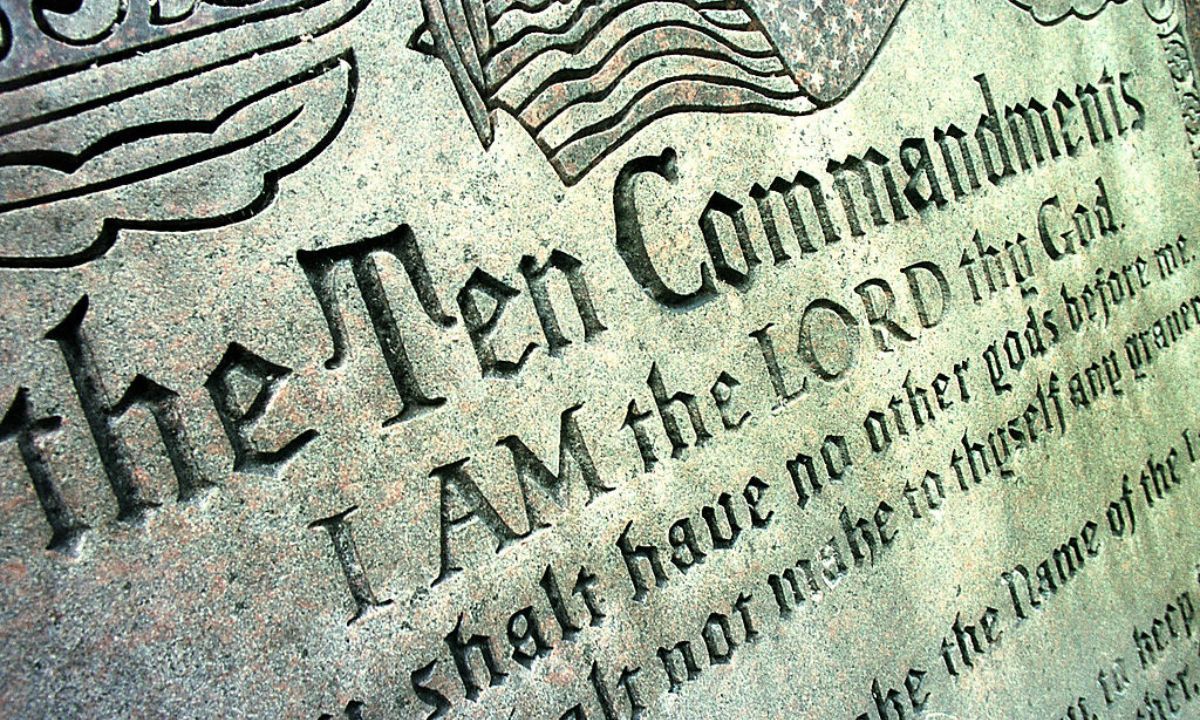Court Lets Louisiana Require Classroom Display of Ten Commandments — for Now
9 families sued 5 districts claiming the mandate is unconstitutional. Rule will take effect in the other 68 on Jan. 1

Get stories like these delivered straight to your inbox. Sign up for The 74 Newsletter
In a 2-1 ruling, a federal appellate panel has ordered that a Louisiana law compelling schools to display the Ten Commandments in classrooms can go into effect in 68 of the state’s 72 districts. The Fifth Circuit Court of Appeals decision at least temporarily overturns a lower court order blocking the law from taking effect Jan. 1, 2025.
The other five districts are among the defendants in a suit filed by nine families, charging that the law is unconstitutional. The mandate is on hold in East Baton Rouge, Livingston, Orleans, St. Tammany and Vernon parishes until the appellate court takes up the issue. State Superintendent Cade Brumley and members of the Louisiana Board of Elementary and Secondary Education are also defendants.
On Nov. 12, U.S. District Judge John DeGravelles issued a 177-page ruling barring the law from taking effect, saying the state was not likely to prevail in the suit. Represented by the American Civil Liberties Union, Americans United for Separation of Church & State and the Freedom from Religion Foundation, the plaintiffs include atheists, Jews, and Presbyterian and Unitarian Universalist clergy, among others.
State Attorney General Liz Murrill filed an appeal asking that the mandate take effect in the 68 parishes not named in the lawsuit, and the appellate panel ruled in her favor.
The first mandate of its kind in more than 40 years, the law calls for classroom posters at least 11 by 14 inches in size displaying a state-approved version of the biblical laws in a “large, easily readable font,” accompanied by a statement describing “the history of the Ten Commandments in American Public Education.”
Passed in June, the act requires that a specific, Protestant version be used, accompanied by a “context statement” asserting that “the Ten Commandments were a prominent part of American education for almost three centuries.” Supposed examples given include “The New England Primer,” created around 1688, McGuffey “Readers” from the early 1800s and textbooks published by Noah Webster, DeGravelles noted in his opinion.
“I can’t wait to be sued,” Louisiana Gov. Jeff Landry told attendees at a GOP fundraiser this summer, as he prepared to sign the edict. “If you want to respect the rule of law, you got to start from the original law given, which was Moses’. He got his commandments from God.”
Far-right lawmakers in Texas, Utah and South Carolina this year considered but did not pass similar bills, while Oklahoma Superintendent of Public Instruction Ryan Walters ordered schools in his state to incorporate the Bible — “which includes the Ten Commandments,” he noted in his order — as “an instructional support into the curriculum.”
At the time the Louisiana suit was filed, legal analysts told The 74 the mandate appeared to set up a case that would essentially dare the U.S. Supreme Court to reinterpret the First Amendment’s opening line — “Congress shall make no law respecting an establishment of religion, or prohibiting the free exercise thereof.” Courts have repeatedly held that the Establishment Clause prohibits the creation or endorsement of a state religion.
The plaintiffs accuse Landry of making “false statements relating to a purported history and connection between the Ten Commandments and government and public education in the United States,” in one instance by fabricating a quote to that effect by James Madison, the Constitution’s primary author. In fact, the complaint says, what Madison wrote was that “The purpose of separation of church and state is to keep forever from these shores the ceaseless strife that has soaked the soil of Europe in blood for centuries.”
With 12 of its 17 active judges Republican appointees — six named by President-elect Donald Trump during his first term — the 5th Circuit is the most conservative court in the nation. It has become a key venue for model legislation drafted by the conservative Christian legal advocacy group Alliance Defending Freedom and others hoping to advance cases that could allow the Supreme Court to shift precedents. The most notable of these has been Dobbs vs. Jackson Women’s Health Organization, the Mississippi suit that overturned abortion rights.
In addition to appealing the Ten Commandments lawsuit, Murrill recently sued the U.S. Department of Health and Human Services, arguing that a major law requiring a host of protections for students with disabilities is unconstitutional. Ostensibly, the lawsuit seeks to overturn a Biden administration rule that Section 504 of the Rehabilitation Act of 1973 protects those who experience gender dysphoria, a clinical diagnosis given to some transgender people.
If Murrill succeeds, however, the case could create a precedent weakening laws against numerous prohibitions on in-school discrimination, according to disability advocates and attorneys cited by the New Orleans news site The Lens, which first reported on the state’s suit against federal officials.
Get stories like these delivered straight to your inbox. Sign up for The 74 Newsletter


